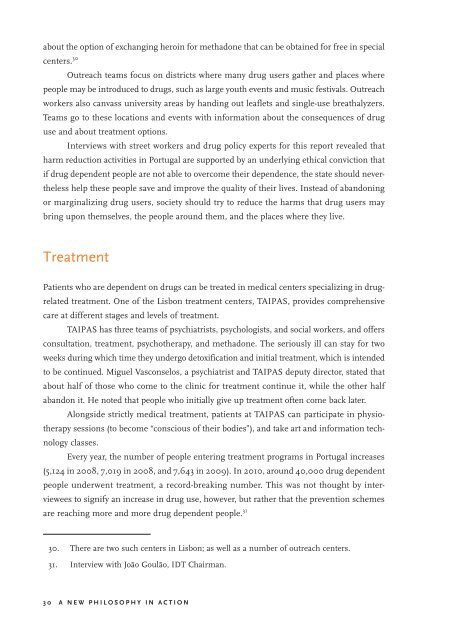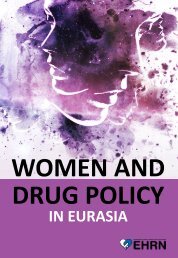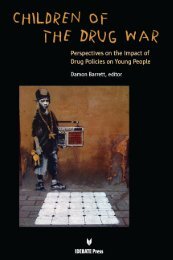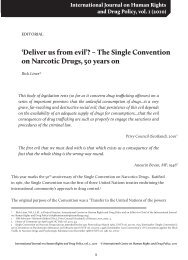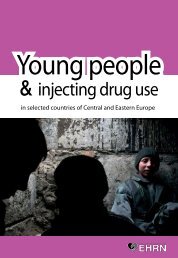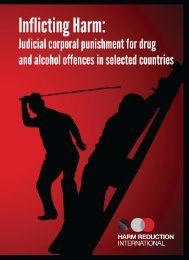From the Mountaintops-2011-Portugal-proof3.indd - Global Initiative ...
From the Mountaintops-2011-Portugal-proof3.indd - Global Initiative ...
From the Mountaintops-2011-Portugal-proof3.indd - Global Initiative ...
You also want an ePaper? Increase the reach of your titles
YUMPU automatically turns print PDFs into web optimized ePapers that Google loves.
about <strong>the</strong> option of exchanging heroin for methadone that can be obtained for free in specialcenters. 30Outreach teams focus on districts where many drug users ga<strong>the</strong>r and places wherepeople may be introduced to drugs, such as large youth events and music festivals. Outreachworkers also canvass university areas by handing out leaflets and single-use breathalyzers.Teams go to <strong>the</strong>se locations and events with information about <strong>the</strong> consequences of druguse and about treatment options.Interviews with street workers and drug policy experts for this report revealed thatharm reduction activities in <strong>Portugal</strong> are supported by an underlying ethical conviction thatif drug dependent people are not able to overcome <strong>the</strong>ir dependence, <strong>the</strong> state should never<strong>the</strong>lesshelp <strong>the</strong>se people save and improve <strong>the</strong> quality of <strong>the</strong>ir lives. Instead of abandoningor marginalizing drug users, society should try to reduce <strong>the</strong> harms that drug users maybring upon <strong>the</strong>mselves, <strong>the</strong> people around <strong>the</strong>m, and <strong>the</strong> places where <strong>the</strong>y live.TreatmentPatients who are dependent on drugs can be treated in medical centers specializing in drugrelatedtreatment. One of <strong>the</strong> Lisbon treatment centers, TAIPAS, provides comprehensivecare at different stages and levels of treatment.TAIPAS has three teams of psychiatrists, psychologists, and social workers, and offersconsultation, treatment, psycho<strong>the</strong>rapy, and methadone. The seriously ill can stay for twoweeks during which time <strong>the</strong>y undergo detoxification and initial treatment, which is intendedto be continued. Miguel Vasconselos, a psychiatrist and TAIPAS deputy director, stated thatabout half of those who come to <strong>the</strong> clinic for treatment continue it, while <strong>the</strong> o<strong>the</strong>r halfabandon it. He noted that people who initially give up treatment often come back later.Alongside strictly medical treatment, patients at TAIPAS can participate in physio<strong>the</strong>rapysessions (to become “conscious of <strong>the</strong>ir bodies”), and take art and information technologyclasses.Every year, <strong>the</strong> number of people entering treatment programs in <strong>Portugal</strong> increases(5,124 in 2008, 7,019 in 2008, and 7,643 in 2009). In 2010, around 40,000 drug dependentpeople underwent treatment, a record-breaking number. This was not thought by intervieweesto signify an increase in drug use, however, but ra<strong>the</strong>r that <strong>the</strong> prevention schemesare reaching more and more drug dependent people. 3130. There are two such centers in Lisbon; as well as a number of outreach centers.31. Interview with João Goulão, IDT Chairman.30 A NEW PHILOSOPHY IN ACTION


